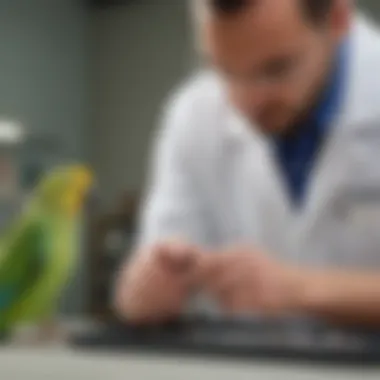Understanding Parakeet Vet Costs: A Comprehensive Guide


Intro
Understanding the various costs associated with veterinary care for parakeets is essential to ensuring their well-being. The financial commitments involved are not always apparent when bringing a parakeet into your home. From routine check-ups to potential emergencies, expenses can add up quickly. This guide provides a detailed examination of the different factors that influence vet costs for parakeets, helping owners to make informed decisions about their pets' health.
Understanding Your Pet
Pet Behavior Basics
Parakeets have unique behaviors that can influence their health needs and, subsequently, vet costs. They are social creatures, often requiring interaction with both humans and other birds. Understanding their behavior is crucial for monitoring their health. An unhappy parakeet may exhibit signs of stress such as feather plucking or excessive squawking.
Common Breed Characteristics
Common breeds of parakeets include the budgerigar and the English budgie. Each breed has slightly different health concerns. For example, some breeds may be more prone to breathing issues or feather diseases, which can lead to higher veterinary expenses. Knowing these characteristics helps in predicting potential health problems.
Species-Specific Needs
Parakeets have species-specific needs, such as diet and living environment. A proper diet, rich in seeds, fruits, and greens, is crucial for their well-being. Nutritional deficiencies can lead to health issues which often require medical attention. Regular consultations with a veterinarian familiar with avian care are recommended to address these needs.
Pet Care and Maintenance
Feeding Guidelines
Proper nutrition is the backbone of any pet’s health. Providing a balanced diet helps minimize visits to the vet. Recommended feeding for parakeets includes a mix of quality seeds, pellets, and fresh fruits or vegetables. However, be cautious with the amount as overfeeding can lead to obesity, which may result in more frequent vet check-ups.
Grooming Essentials
Regular grooming is necessary for parakeets. This includes cutting their nails and checking their feathers. Keeping them clean can help prevent skin diseases. Owners should also consider providing opportunities for natural wear, such as wood perches.
Hygiene Practices
A clean environment contributes to a parakeet's health. Regular cage cleaning is necessary. This includes changing the bedding and sanitizing food and water dishes. Maintaining hygiene reduces the risk of illness, ultimately impacting vet costs positively.
Health and Wellness
Routine Vet Check-ups
Routine veterinary check-ups are critical for early detection of health issues. A standard exam may cost between $45 to $100. Consistent visits can prevent minor issues from escalating, thereby saving on potential expensive treatments down the line.
Vaccination Needs
While parakeets do not require extensive vaccinations like some pets, maintaining a vaccination schedule for certain conditions is recommended. Discuss with your veterinarian what vaccinations are appropriate for your parakeet's age and health status to ensure comprehensive care and minimize any sudden expenses.
Recognizing Signs of Illness
Recognizing signs of illness early is essential in managing costs. Symptoms such as lethargy, a change in appetite, or abnormal droppings should prompt immediate veterinary attention. Delayed actions can lead to more serious conditions requiring costly treatments.
Enrichment and Activities
Indoor vs.
Outdoor Activities
Creating an engaging environment is vital for a parakeet's mental health. Both indoor and outdoor activities have their benefits. Indoor activities like providing toys and climbing structures promote exercise and mental stimulation. Outdoor exposure, if safe, can provide new experiences but requires supervision.
Interactive Toys and Games
Purchasing interactive toys can stimulate your parakeet and help prevent behavioral issues. Toys that encourage foraging and play can reduce the likelihood of stress-related health problems, resulting in fewer vet visits.


Socialization Opportunities
Social interactions, whether with other birds or humans, are important for healthy development. Encouraging positive social experiences decreases anxiety. This measure could lead to substantial savings in potential behavioral therapy or medical expenses in the future.
Understanding the health care needs of your parakeet will ultimately guide you in estimating veterinary expenses. Knowledge is not just power; it is a way to protect your finances.
Overview of Parakeet Veterinary Care
Parakeets, or budgerigars, are popular pets due to their vibrant colors and charming personalities. However, like all animals, they require appropriate healthcare to thrive. Understanding the nuances of veterinary care for parakeets is crucial for owners who want to ensure their pets are healthy and happy.
Importance of Veterinary Care
Veterinary care for parakeets serves multiple purposes. Firstly, regular check-ups help in early detection of health issues. These birds can be quite adept at hiding symptoms, making it essential for owners to enlist professional care. Regular visits to an avian vet can keep immunizations up to date, helping prevent diseases such as psittacosis or avian polyomavirus.
Moreover, engaging with a veterinarian provides owners with valuable education about parakeet care. Topics may include proper nutrition, behavior monitoring, and environmental needs. Positive interactions with a veterinarian can extend a pet's lifespan and improve its quality of life.
Additionally, preventive care reduces long-term costs. It is better to invest in regular vet visits than to deal with advanced illness that may require extensive and costly treatments.
Common Health Issues in Parakeets
Parakeets are susceptible to various health issues that can be serious if left unaddressed. Some of the most common problems include:
- Respiratory ailments: Parakeets can fall victim to respiratory infections, which are often characterized by nasal discharge, difficulty breathing, or wheezing.
- Feather plucking: This behavioral issue can signal stress or health problems, making it crucial for owners to seek vet advice.
- Obesity: Due to a poor diet, parakeets may become overweight, leading to complications such as diabetes or heart disease.
- Paulparexia: This condition involves a loss of appetite and can indicate underlying health issues that require immediate attention.
Recognizing these issues early can lead to effective treatment and management. Overall, a solid grasp of the importance of veterinary care is key for any parakeet owner seeking to foster a healthy living environment for their feathered companions.
Factors Affecting Vet Costs for Parakeets
Understanding the factors that influence veterinary costs is crucial for parakeet owners. Veterinary care can vary significantly. Several elements come into play. Geographic location, the type of services required, and specialized care all affect your expenses. Knowing these variables can lead to better financial planning for pet care.
Geographic Location
The location where you live significantly influences the cost of veterinary care for parakeets. Urban areas may have higher fees due to the cost of living and the concentration of veterinary practices. Rural areas, on the other hand, may offer lower prices but fewer specialized services.
Moreover, it's essential to consider the availability of avian veterinarians in your location. Not every veterinary clinic is equipped to handle birds. If a specialist is needed, that could add to your travel expenses and time.
Type of Veterinary Services Required
Veterinary services include various treatments and procedures. Each serves a distinct purpose and varies in cost. Here are details on three key categories of veterinary care:
Routine Check-Ups
Routine check-ups are essential for maintaining your parakeet's health. This service allows for the early detection of potential issues. During these visits, a veterinarian will assess your bird's overall condition. This includes checking its feathers, weight, and general behavior. The average fee for a routine check-up is often more affordable compared to specialized treatments. Routine check-ups can detect health concerns early, possibly avoiding expensive treatments later on. Regular check-ups also provide valuable advice on diet and care.
Emergency Care
Emergency care is an important consideration for all pet owners. This type of service is designed to address urgent medical issues that require immediate attention. For example, if a parakeet shows signs of distress, an emergency visit is essential. Emergency care can be quite costly when compared to routine visits due to the immediate nature of the services provided. However, timely treatment can be life-saving and prevent extensive health issues down the line.
Preventive Treatments
Preventive treatments are designed to mitigate health risks before they manifest. These can include vaccinations or parasite control. They are essential in keeping your parakeet healthy in the long term. While these services can add to immediate costs, they often save money later by reducing the likelihood of serious health issues. Weighing the initial costs against potential long-term benefits is crucial for making informed decisions about parakeet care.
Specializations in Avian Medicine
Specializations in avian medicine can also affect veterinary costs. Not all veterinarians have the training to handle birds, especially parakeets. It is important to seek a vet with expertise in avian care. Specialized services may come at a premium. However, the knowledge and experience a specialized vet brings can greatly enhance the quality of care your parakeet receives. Finding the right balance between cost and quality is key.
Choosing the right veterinary path for your parakeet may involve some expense. However, understanding the factors can help make better healthcare decisions that benefit your bird's health and wellbeing.
Typical Costs of Parakeet Vet Visits


Understanding the typical costs associated with parakeet vet visits is fundamental for any owner. Being aware of these expenses helps in budgeting and ensures the overall well-being of the pet. Veterinary visits are not only about treating illnesses; they play a critical role in maintaining the health of your parakeet. Routine check-ups can help identify potential health problems before they become severe.
Estimated Price Range for Routine Visits
Routine veterinary visits are vital for parakeets, generally costing between $30 to $65. This range may vary based on location and the specific veterinary practice. During these visits, the vet usually conducts a full health evaluation, which may include weight monitoring, nutritional guidance, and advice on keeping your parakeet healthy. Regular check-ups also offer opportunities for vaccinations, which are essential for disease prevention.
Cost of Emergency Treatments
Emergency veterinary treatments can be significantly more expensive than routine visits. Costs can range from $150 to $400, depending on the severity of the condition and required interventions. Emergencies may include accidents, sudden illnesses, or acute symptoms that require immediate attention. Quick diagnosis and treatment can save lives, making it crucial to factor these potential costs into your budget for parakeet care.
Prices of Common Procedures
Blood Tests
Blood tests are a standard procedure during vet visits, serving as a diagnostic tool for various conditions. The cost typically ranges from $80 to $150. Blood tests help in detecting underlying health issues, such as infections, organ failures, or nutritional deficiencies. This procedure is advantageous as it provides critical information about your parakeet's health, guiding the veterinarian in deciding the best course of treatment. However, costs might be higher in emergency situations or when additional tests are necessary.
X-rays
X-rays are often used to assess physical injuries or internal issues. The cost for X-rays can range from $100 to $300. This imaging technique is key in identifying problems like broken bones or respiratory issues. The uniqueness of X-rays lies in their ability to provide a visual representation of internal structures without invasive procedures. However, they can be costly, and repeated examinations might lead to additional expenses.
Surgery Costs
Surgery costs for parakeets can vary greatly, typically ranging from $200 to $1000. Surgical interventions may be required for various reasons, including tumor removals or repairing injuries. Surgery is often the only option for serious conditions, making it an essential part of avian care. The price reflects the complexity of the procedure and post-operative care requirements. While surgery can be expensive, preemptive measures may reduce the need for such treatments in the future.
The costs related to parakeet vet visits encompass a range of routine and emergency services, providing critical insights into maintaining your pet's health.
Preventive Care and Its Financial Impact
Preventive care plays a crucial role in the overall health of parakeets. Understanding its financial implications can affect long-term costs and the well-being of your pet. Preventive care includes routine check-ups, vaccinations, and even nutritional advice. Investing in these areas can lead to healthier birds and potentially lower veterinary expenses in the future.
Benefits of Routine Check-Ups
Routine check-ups serve as the first line of defense against health issues in parakeets. These visits allow veterinarians to conduct thorough examinations that can identify potential problems before they escalate. The benefits include:
- Early detection of diseases
- Monitoring of weight and overall condition
- Behavioral assessments to gauge mental health
- Professional recommendations for diet and environment
By scheduling regular vet visits, parakeet owners can substantially improve their birds' quality of life and reduce the chances of costly emergency interventions later on.
Vaccinations and Their Costs
Vaccinations are essential for preventing illnesses that are common in parakeets. Different avian species can be susceptible to various diseases, making vaccinations an important consideration for responsible pet ownership. The costs for these vaccinations may vary, depending on the vet's practice and geographic region. Basic vaccination expenses can usually range from $25 to $75 per visit.
Understanding which vaccines are necessary for your parakeet can save money in the long term by preventing serious health issues. Always consult your avian vet to establish a vaccination schedule tailored to your pet's needs.
Nutritional Guidance and Its Relevance
Nutrition significantly affects the overall health and longevity of parakeets. Proper nutrition helps avoid many health issues, from obesity to feather plucking. Consulting a veterinary professional about diet creates a stronger foundation for your pet's well-being.
Guidance may include:
- Specific types of seeds or pellets to use
- Fresh fruits and vegetables that can be included in your parakeet's diet
- Supplements that might be necessary
The investment in nutritional guidance can lead to less frequent vet visits and healthier living for these birds. In this way, preventive care practices foster both immediate and long-term financial benefits for parakeet owners.
Regular veterinary care early in a bird’s life often precedes better health outcomes, making preventive care a vital investment.
Insurance Options for Parakeets


Understanding the insurance options for parakeets is crucial for pet owners who want to ensure they can provide proper veterinary care without sudden financial stress. Parakeets, like any other pet, can face unexpected health issues, making it essential to be prepared. Insurance can offset some of the costs associated with veterinary treatments, thus providing peace of mind.
Types of Pet Insurance Available
Pet insurance comes in various forms, tailored to different needs. Here are the main types available for parakeet owners:
- Accident-Only Insurance: This type covers injuries caused by accidents but does not include illnesses. It is usually the least expensive option, making it ideal for owners looking for basic protection.
- Illness Insurance: This provides coverage for a wide range of health issues that can affect parakeets, including respiratory infections and other diseases.
- Comprehensive Insurance: Comprehensive plans generally combine accident and illness coverage. They offer the most extensive protection and can cover preventive care, like vaccinations, in some plans.
- Wellness Plans: While not technically insurance, wellness plans can be added to standard policies. They cover routine check-ups, vaccinations, and other preventive care at a lower cost than paying for each service individually.
Choosing the right type depends on several factors, including the parakeet’s health history and the owner's financial situation.
Evaluating Insurance Cost vs.
Expenses
When considering pet insurance, it is important for owners to weigh the cost of premiums against potential veterinary expenses. Here are several considerations to keep in mind:
- Premium Costs: Monthly premiums can vary greatly based on the type of insurance chosen. Factors such as the age of the parakeet and its current health can also influence premium rates.
- Deductibles and Co-Pays: Like human health insurance, pet insurance often includes a deductible and co-pay. It's vital to understand these terms, as they can significantly affect out-of-pocket costs during a claim.
- Coverage Limits: Each policy has its coverage limits, meaning there is a maximum amount the insurance will pay for a covered incident. Owners should ensure that these limits meet their financial needs.
- Claims Process: Understanding how the claims process works is essential. Some insurers pay the veterinarian directly, while others require the owner to pay up front and then submit for reimbursement. This can affect cash flow during a medical emergency.
Effective evaluation involves considering how much potential veterinary costs could arise over time, especially considering the average expenses associated with emergency procedures mentioned earlier. Balancing insurance costs against these potential expenses can help owners make an informed choice.
Insurance is not just about saving money. It is about being prepared for your parakeet's health needs as they arise.
Cost-Saving Tips for Parakeet Owners
Veterinary care can be a significant expense for parakeet owners. Understanding ways to save money while keeping your pet healthy is essential. In this section, we will explore practical tips to manage costs effectively without compromising the care your parakeet deserves.
Regular Maintenance and Care
Regular maintenance is crucial for the health of your parakeet. This involves daily tasks such as feeding, cleaning, and monitoring behavior. These actions can help prevent health issues that may require more costly veterinary treatments later.
Here are some key points on how to maintain your parakeet’s well-being:
- Proper Diet: Ensure your parakeet has a balanced diet. This includes fresh fruits, vegetables, and high-quality pellets. Avoid excessive seeds as they can lead to nutritional deficiencies.
- Clean Living Environment: Regularly clean the cage and accessories to prevent diseases. Clean water and food dishes daily, and replace bedding as needed.
- Social Interaction: Parakeets are social creatures. Spend time with your pet daily. Their happiness can impact their physical health, reducing the need for vet visits.
By maintaining these daily habits, you can often spot early signs of health problems. This vigilance can lead to earlier interventions, which can be less costly than treating advanced conditions.
Finding Affordable Veterinary Services
When parakeets require medical attention, finding an affordable vet is essential. Not all veterinary services are the same; some may charge higher fees without significant benefits. Here are some strategies for finding economical options:
- Research Local Clinics: Investigate local veterinary offices that specialize in avian care. Some clinics might offer lower prices or special promotions.
- Seek Recommendations: Ask other parakeet owners for their vet recommendations. Personal experiences can help identify practices that are both affordable and reputable.
- Check for Non-Profit Organizations: Some animal welfare organizations provide veterinary services at reduced rates.
“A little research can unveil significant savings for pet owner.”
- Inquire About Payment Plans: Some veterinary clinics offer payment plans to help ease the burden of immediate large expenses.
In short, financial awareness in selecting veterinary services can lead to cost savings. Being proactive in your search can ensure your parakeet receives quality care without straining your budget.
Closure
Understanding the veterinary cost for parakeets is not just about knowing the dollar amount. It is about recognizing the responsibility that comes with pet ownership. Knowledge of these costs helps you plan and prepare for inevitable expenses. The clear view of what to expect allows for better decision-making regarding your pet's health.
Recap of Parakeet Veterinary Expenses
Throughout this article, we explored various facets of parakeet veterinary expenses. Routine care, emergency treatments, and preventive measures comprise the bulk of potential costs. Knowing how much to allocate for each aspect allows for more effective budgeting. Key points include:
- Routine Check-Ups: Regular visits can range from $50 to $100, depending on your location and veterinary practice.
- Emergency Treatments: These can skyrocket, with costs going well beyond $500, especially for urgent care.
- Preventive Care: Investing in vaccinations and nutritional guidance, though an upfront expense, can save money in the long run by preventing serious health issues.
It is essential for pet owners to grasp the variety of expenses associated with parakeet care to ensure their health and well-being is prioritized.
Final Considerations for Pet Owners
As a parakeet owner, be proactive about your pet’s health. Regular check-ups, timely vaccinations, and proper dietary choices are not just expenses; they are investments in a happier, healthier life for your pet.
Consider insurance options but be sure to thoroughly evaluate terms and benefits. Take note of your geographic location, as veterinary costs vary. It's also prudent to establish a good relationship with your avian veterinarian to help facilitate long-term care. Ultimately, prioritizing your parakeet's health can lead to better quality of life and can reduce the financial burden of unexpected medical issues.







